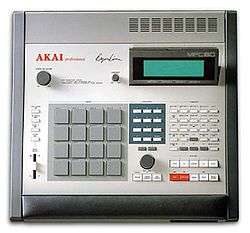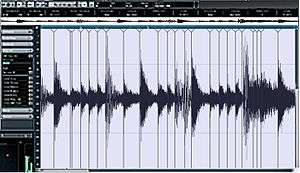Audio sequencer
| Look up audio sequencer in Wiktionary, the free dictionary. |
The term "audio sequencer" or "audio sequencing" seems to be not clearly defined (not defined on wiktionary), because it is relatively new expression.

Music sequencer, a class of device or music software to record, edit, and play back the music, by handling musical notes and performance information in various forms
Several people tend to use the term "audio sequencer"[1] to refer several kind of "music sequencer" (see external link 1). However, their definition seems unclear (see external link 2).
.jpg) Digital audio workstation (DAW), Hard disk recorder — an class of audio software or dedicated system primarily designed to record, edit, and play back digital audio, first appeared in the late 1970s and emerging since the 1990s. After the 1990s–2000s, several DAWs for music production were integrated with music sequencer. In today, "DAW integrated with MIDI sequencer" is often simply abbreviated as "DAW", or sometimes referred as "Audio and MIDI sequencer",[2] etc. On the later usage, the term "audio sequencer" is just a synonym for the "DAW". |
.jpg) Loop-based music software — a class of music software for Loop-based music compositions and remix, emerging since late 1990s. Typical software included ACID Pro (1998), Ableton Live (2001), GarageBand (2004), etc. And now, several of them are referred as DAW, resulting of the extensions and/or integrations. This type of software really control sequence of audio samples, thus, possibly we can call it "audio sequencer". |
 Phrase sampler (or phrase sampling) — similar to above, musicians or remixers sometimes remixed or composed songs by sampling relatively long phrases or part of songs, and then rearranging these on grooveboxes or a combination of sampler (musical instrument) and sequencer. This technique is possibly referred as "audio sequencing". |
 Beat slicing — before DAW became popular, several musicians sometimes derived various beats from limited drum sample Loop by slicing beats and rearranging them on samplers. This technique was popularized with the introduction of "beat slicer" tool, especially the "ReCycle" released in 1992. Possibly it may be one origin of "audio sequencing". |
References
- ↑ Pejrolo, Andrea (2011). "1.7.1 The Primary Goals You Want to Achieve with Your Audio Sequencer". Creative Sequencing Techniques for Music Production: A Practical Guide to Pro Tools, Logic, Digital Performer, and Cubase. Taylor & Francis. p. 48. ISBN 978-0-240-52216-6.
Note: an example of section title containing "Audio Sequencer". - ↑ MusE – The open source sequencer,
MusE is a MIDI/Audio sequencer with recording and editing capabilities ...
External links
- 1. "Search results of "audio sequencer"", Google.com
- 2. "Amazon.com: Audio Sequencers: Musical Instruments", Amazon.com